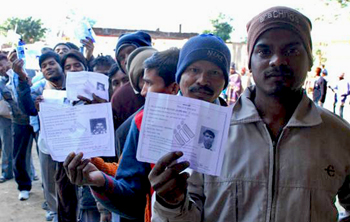 Ranchi, Dec 9: Amid tight security, nearly 13 per cent of the electorate exercised their franchise in the first two hours of polling in 17 constituencies spread across eight districts of Jharkhand on Tuesday.
Ranchi, Dec 9: Amid tight security, nearly 13 per cent of the electorate exercised their franchise in the first two hours of polling in 17 constituencies spread across eight districts of Jharkhand on Tuesday.
While Koderma recorded the maximum 16.90 per cent voting in the first two hours, Barkagaon constituency witnessed the minimum at 7.60 per cent, polling officials said.
Some faulty EVMs were immediately replaced on receiving complaints from a few polling booths, they said.
Voters were seen standing in queues in front of the booths from 7 AM and were keeping themselves warm by lighting small fires by the roadside near booths.
Former Jharkhand chief minister Babulal Marandi, ex—Assembly speaker C P Singh and three incumbent ministers are among the candidates whose fate will be decided in today’s election.
Besides Dhanwar where polls are being held today, Babulal Marandi is also contesting from Giridh where elections will be held in the next phase on December 14.
Eight MLAs are seeking re—elections in this phase, having 103 independent candidates out of a total of 289, including 26 women.
Security forces are keeping a close watch in the Maoist—affected areas where 1,957 booths have been marked as highly sensitive and 1,477 as sensitive booths.
There are as many as 2,713,65 voters in the 18/19 age group in the electorate of 50,16,657, including 23,55,728 women.
The constituencies going to the poll in the third phase are Kodarma, Barkatha, Barhi, Barkagaon, Ramgarh, Mandu, Hazaribagh, Simaria (SC), Dhanwar, Gomia, Bermo, Ichagarh, Silli, Khijri (ST), Ranchi, Hatia and Kanke (SC).
Polling will end at 3 PM in 14 constituencies and at 5 PM in Ranchi, Hatia and Kanke constituencies.
Polling was going on peacefully at Ichagarh constituency where JVM (Prajatantrik) candidate and sitting MLA Arvind Kumar Singh and 11 others were arrested following a clash between his supporters and BJP workers in adjoining Seraikela—Kharswan district in the early hours.
DIG (Kolhan) Md Nehal said the incident had nothing to do with the polls.
Polling for 33 of the 81 seats was held on November 25 and December 2 which registered 61.92 per cent and 64.68 per cent voters’ turnout respectively.





Comments
Add new comment